初中八种时态详解和练习
初中八种英语时态精讲精练(含答案)
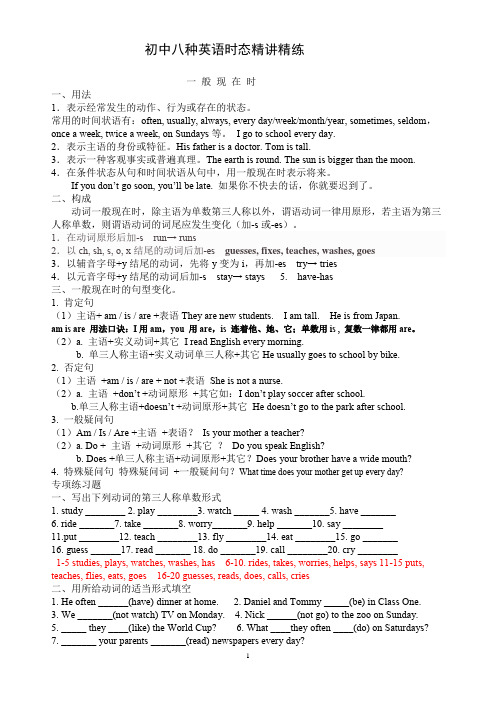
初中八种英语时态精讲精练一般现在时一、用法1.表示经常发生的动作、行为或存在的状态。
常用的时间状语有:often, usually, always, every day/week/month/year, sometimes, seldom,once a week, twice a week, on Sundays等。
I go to school every day.2.表示主语的身份或特征。
His father is a doctor. Tom is tall.3.表示一种客观事实或普遍真理。
The earth is round. The sun is bigger than the moon. 4.在条件状态从句和时间状语从句中,用一般现在时表示将来。
If you don’t go soon, you’ll be late. 如果你不快去的话,你就要迟到了。
二、构成动词一般现在时,除主语为单数第三人称以外,谓语动词一律用原形,若主语为第三人称单数,则谓语动词的词尾应发生变化(加-s或-es)。
1.在动词原形后加-s run→ runs2.以ch, sh, s, o, x结尾的动词后加-es guesses, fixes, teaches, washes, goes3.以辅音字母+y结尾的动词,先将y变为i,再加-es try→ tries4.以元音字母+y结尾的动词后加-s stay→ stays 5. have-has三、一般现在时的句型变化。
1. 肯定句(1)主语+ am / is / are +表语They are new students. I am tall. He is from Japan.am is are 用法口诀:I用am,you 用are,is 连着他、她、它;单数用is , 复数一律都用are。
(2)a. 主语+实义动词+其它I read English every morning.b. 单三人称主语+实义动词单三人称+其它He usually goes to school by bike.2. 否定句(1)主语+am / is / are + not +表语She is not a nurse.(2)a. 主语+don’t +动词原形+其它如:I don’t pla y soccer after school.b.单三人称主语+doesn’t +动词原形+其它He doesn’t go to the park after school.3. 一般疑问句(1)Am / Is / Are +主语+表语?Is your mother a teacher?(2)a. Do + 主语+动词原形+其它?Do you speak English?b. Does +单三人称主语+动词原形+其它?Does your brother have a wide mouth?4. 特殊疑问句特殊疑问词+一般疑问句?What time does your mother get up every day?专项练习题一、写出下列动词的第三人称单数形式1. study ________2. play ________3. watch _____4. wash _______5. have _______6. ride _______7. take _______8. worry_______9. help _______10. say ________11.put ________12. teach ________13. fly ________14. eat ________15. go _______16. guess ______17. read _______ 18. do _______19. call ________20. cry ________1-5 studies, plays, watches, washes, has 6-10. rides, takes, worries, helps, says 11-15 puts, teaches, flies, eats, goes 16-20 guesses, reads, does, calls, cries二、用所给动词的适当形式填空1. He often ______(have) dinner at home.2. Daniel and Tommy _____(be) in Class One.3. We _______(not watch) TV on Monday.4. Nick ______(not go) to the zoo on Sunday.5. _____ they ____(like) the World Cup?6. What ____they often ____(do) on Saturdays?7. _______ your parents _______(read) newspapers every day?8. The girl _______(teach) us English on Sundays.9. She and I ________(take) a walk together every evening.10. The moon ________ (travel) round the earth.11. It usually ________ (take) me more than two hours to finish my homework.12. I will tell him the good news as soon as he ________ (come) back.13. Miss Gao is very busy. She ________ (sleep) six hours a day.14. Look! Susan ________ (dance) in the garden. She often ________ (dance) there.15. The children will go to the Summer Palace if it ________ (not rain) tomorrow.16. I _________ any pears (not have). But Mary _________ some (have).17. What language ____ you _____? (speak) 18. My brother _____ to be a scientist. (not like) 19. We ______ Japanese at school. (not study) 20. He _____ playing football. (not like)1. has2. are3. don’t have4. doesn’t go5. Do like6. do, do7. Do, read8. teaches9. take 10. travels 11. takes 12. comes 13. sleeps 14. is dancing, dances 15. doesn’t rain 16. don’t have, has 17. do, speak 18. doesn’t like 19. don’t study 20. doesn’t like三、按照要求改写句子1. Daniel watches TV every evening.(改为否定句)_________________________2. I do my homework every day.(改为一般疑问句,并作肯、否定回答)________________________________________________________3. Amy likes playing computer games.(改为一般疑问句,并作肯、否定回答)___________________________________________________4. We go to school every morning.(改为否定句)____________________________5. Sun Yang usually washes some clothes on Saturday.否定句: _____________ 一般疑问句: ________________ 划线提问: ____________6. Tom does his homework at home.否定句: ______________ 一般疑问句: ____________ 划线提问_____________1. Daniel doesn’t watch TV every evening.2. Do you do your homework every day? Yes, I do. No, I don’t.3. Does Amy like playing computer games? Yes, she does. No, she doesn’t.4. We don’t go to school every morning.5. Sun Yang doesn’t usually wash any clothes on Saturday. Does Sun Yang usually wash any clothes on Saturday? What does Sun Yang usually do on Saturday?6. Tom doesn’t do his homework at home. Does Tom do his homework at home? Where does Tom do his homework?四、选用所给的词语适当形式填空give, rain, enjoy, sing, return, borrow, keep1. It often ______ in my hometown in summer.2. Sometimes the birds _______ in the tree.3. Joe usually ____ books from the school library, but she never _____ them on time.4. May I ________ the dictionary for a week?5. The little boy ________ himself in the garden on Saturdays.6. Mary is a good girl. She often ________ me a hand when I need some help.1. rains2. sing3. borrows, returns4. keep5. enjoys6. gives一般过去时的用法一、定义:表示过去某一时间所发生的动作或存在的状态;表示在过去一段时间内,经常性或习惯性的动作。
初中八种基本时态讲解及练习
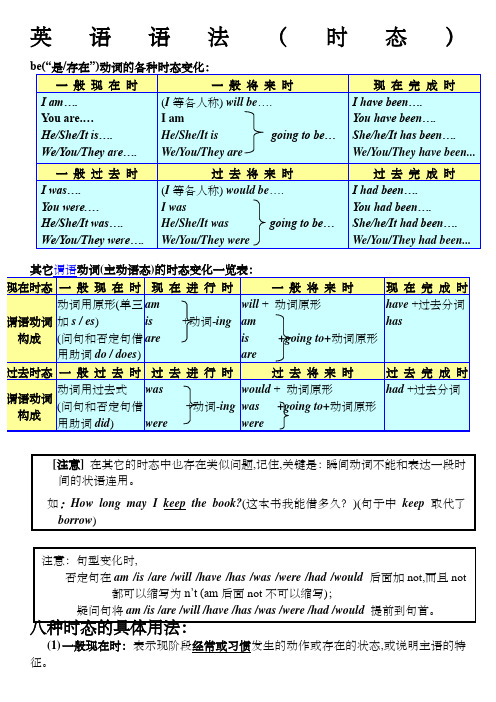
英语语法(时态)注意:句型变化时,否定句在am /is /are /will /have /has /was /were /had /would 后面加not,而且not 都可以缩写为n’t (am后面not不可以缩写);疑问句将am /is /are /will /have /has /was /were /had /would 提前到句首。
八种时态的具体用法:(1)一般现在时:表示现阶段经常或习惯发生的动作或存在的状态,或说明主语的特征。
①一般现在时句子中常有的时间状语:often,usually,sometimes,always,every(day等), once/twice,a (week等), on (Sunday等),never,in the (morning等)。
如:They go to the Palace Museum once a year.(他们每年去一次故宫)/ They often discuss business in the evening.(他们经常在晚上商谈生意)②表示客观真理、事实、人的技能或现在的状态时句子里一般不用时间状语。
如:The earth turns round the sun.(地球绕着太阳转)/Light travels faster than sound.(光传播比声音快)③表示十分确定会发生(如安排好的事情)或按照时间表进行的事情,用一般现在可以表达将来,句子中可以有将来时间。
如:The train for Haikou leaves at 8:00 in the morning.(开往海口的列车上午8点开车)④在时间状语从句中(以when, after, before, while, until, as soon as等引导)和条件状语从句中(以if,unless引导),用一般现在时代替一般将来时,句子可以有将来时间。
如:Please ring me up as soon as you arrive in Germany.(你一到德国就给我打电话) /If it rains tomorrow,we will have to stay at home.(如果明天下雨我们就只好呆在家)⑤一般现在时用于倒装句中可以表示正在发生的动作,动词以come, go为主。
初中英语语法-八种时态详解与练习
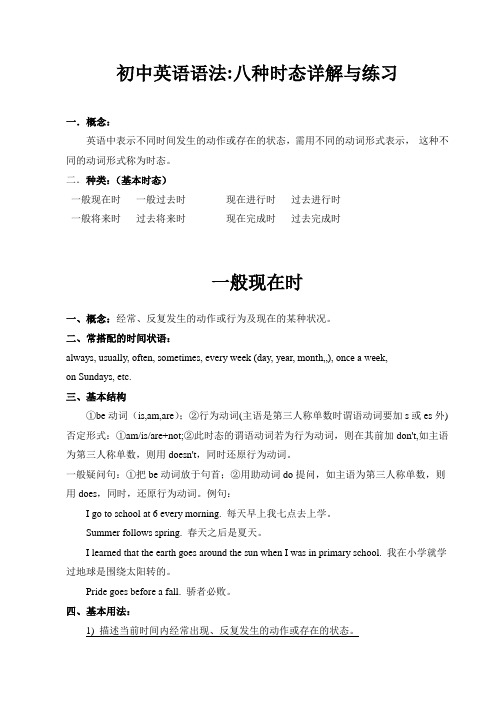
初中英语语法:八种时态详解与练习一.概念:英语中表示不同时间发生的动作或存在的状态,需用不同的动词形式表示,这种不同的动词形式称为时态。
二.种类:(基本时态)一般现在时一般过去时现在进行时过去进行时一般将来时过去将来时现在完成时过去完成时一般现在时一、概念:经常、反复发生的动作或行为及现在的某种状况。
二、常搭配的时间状语:always, usually, often, sometimes, every week (day, year, month…), once a week,on Sundays, etc.三、基本结构①be动词(is,am,are);②行为动词(主语是第三人称单数时谓语动词要加s或es外) 否定形式:①am/is/are+not;②此时态的谓语动词若为行为动词,则在其前加don't,如主语为第三人称单数,则用doesn't,同时还原行为动词。
一般疑问句:①把be动词放于句首;②用助动词do提问,如主语为第三人称单数,则用does,同时,还原行为动词。
例句:I go to school at 6 every morning. 每天早上我七点去上学。
Summer follows spring. 春天之后是夏天。
I learned that the earth goes around the sun when I was in primary school. 我在小学就学过地球是围绕太阳转的。
Pride goes before a fall. 骄者必败。
四、基本用法:1) 描述当前时间内经常出现、反复发生的动作或存在的状态。
在这种情景中,句子常带有表示频率的时间状语:always , everyday , often , once a week (month , year , etc.) , sometimes , seldom , usually等等,以表示句中的动作或状态是习惯性的、经常性的。
初中英语八大时态用法详解及真题巩固练习

初中英语八大时态用法详解及真题巩固练习一般现在时1. 概念:经常、反复发生的动作或行为及现在的某种状况。
2. 基本结构:①is/am/are;②do/does否定形式:①am/is/are + not ; ②此时态的谓语动词若为行为动词,则在其前加don't,如主语为第三人称单数,则用doesn't,同时还原行为动词。
3. 一般疑问句:①把 is/am/are 动词放于句首;②用助动词do提问,如主语为第三人称单数,则用does,同时,还原行为动词。
4. 用法:1) 经常性或习惯性的动作,常与表示频度的时间状语连用。
例如:I leave home for school at 7 every morning. 每天早上我七点离开家。
2) 客观真理,客观存在,科学事实。
例如:The earth moves around the sun. 地球绕太阳转动。
Shanghai lies in the east of China. 上海位于中国东部。
3) 表示格言或警句。
例如:Pride goes before a fall. 骄者必败。
注意:此用法如果出现在宾语从句中,即使主句是过去时,从句谓语也要用一般现在时。
例如:I knew that the earth goes around the sun when I was little.我小时候就知道地球绕太阳转。
4) 现在时刻的状态、能力、性格、个性。
例如:I don't want so much. 我不要那么多。
Ann writes good English but does not speak well.安英语写得不错,讲的可不行。
5) 一般现在时表示将来含义a. 下列动词 come, go, arrive, leave, start, begin, return 的一般现在时可以表示将来,主要用来表示在时间上已确定或安排好的事情。
初中英语八大时态练习试题及答案(详解)

初中英语八大时态练习试题及答案(详解)1一般现在时的用法1) 表示经常性或习惯性的动作,常与表示频度的时间状语连用。
例: every…, sometimes,ofen,always,usually, twice a week, at…, on Sunday等。
I leave home for school at 7 every morning.He watches Tv once a week .2) 表示普遍真理,客观存在,科学事实。
The earth moves around the sun.Shanghai lies in the east ofChina.3) 格言或警句。
Pride goes before a fall. 骄者必败。
注意:此用法如果出现在宾语从句中,即使主句是过去时,从句谓语也要用一般现在时。
例:Columbus proved that the earth is round..4) 表示现在时刻的状态、能力、个性或爱好。
I don't want so much.Ann Wang writes good English but does not speak well.比较:Now I put the sugar in the cup.I am doing my homework now.第一句用一般现在时,用于操作演示或指导说明的示范性动作,表示言行的瞬间动作。
再如:Now watch me, I switch on the current and stand back.第二句中的now是进行时的标志,表示正在进行的动作的客观状况,所以后句用一般现在时。
2一般过去时的用法1)在确定的过去时间里所发生的动作或存在的状态。
时间状语有:yesterday, an hour ago, the other day, in 1982,yesterday morning (afternoon, evening…),last night (week, month, year…), a moment ago , a week ago, three years ago…just now,等。
初中八种基本时态讲解及练习

英语语法(时态)注意:句型变化时,否定句在am /is /are /will /have /has /was /were /had /would 后面加not,而且not 都可以缩写为n’t (am后面not不可以缩写);疑问句将am /is /are /will /have /has /was /were /had /would 提前到句首。
八种时态的具体用法:(1)一般现在时:表示现阶段经常或习惯发生的动作或存在的状态,或说明主语的特征。
①一般现在时句子中常有的时间状语:often,usually,sometimes,always,every(day等), once/twice,a (week等), on (Sunday等),never,in the (morning等)。
如:They go to the Palace Museum once a year.(他们每年去一次故宫)/They often discuss business in the evening.(他们经常在晚上商谈生意)②表示客观真理、事实、人的技能或现在的状态时句子里一般不用时间状语。
如:The earth turns round the sun.(地球绕着太阳转)/Light travels faster than sound.(光传播比声音快)③表示十分确定会发生(如安排好的事情)或按照时间表进行的事情,用一般现在可以表达将来,句子中可以有将来时间。
如:The train for Haikou leaves at 8:00 in the morning.(开往海口的列车上午8点开车)④在时间状语从句中(以when, after, before, while, until, as soon as等引导)和条件状语从句中(以if,unless引导),用一般现在时代替一般将来时,句子可以有将来时间。
如:Please ring me up as soon as you arrive in Germany.(你一到德国就给我打电话) /If it rains tomorrow,we will have to stay at home.(如果明天下雨我们就只好呆在家)⑤一般现在时用于倒装句中可以表示正在发生的动作,动词以come, go为主。
初中英语语法八大时态总结及练习题
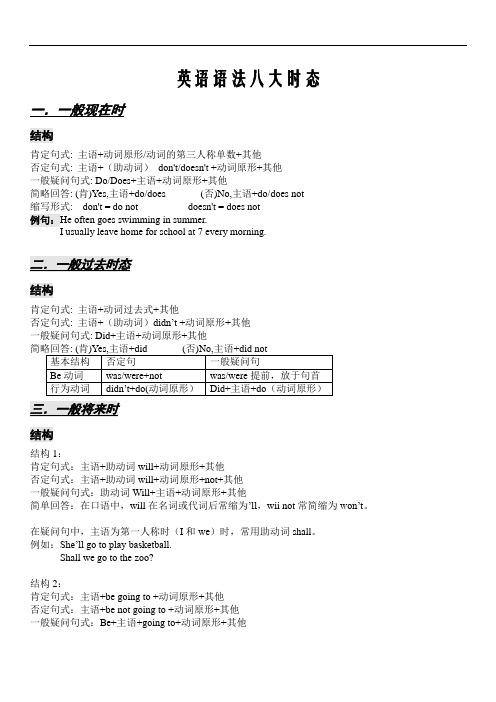
英语语法八大时态一.一般现在时结构肯定句式: 主语+动词原形/动词的第三人称单数+其他否定句式: 主语+(助动词)don't/doesn't +动词原形+其他一般疑问句式: Do/Does+主语+动词原形+其他简略回答: (肯)Yes,主语+do/does (否)No,主语+do/does not缩写形式: don't = do not doesn't = does not例句:He often goes swimming in summer.I usually leave home for school at 7 every morning.二.一般过去时态结构肯定句式: 主语+动词过去式+其他否定句式: 主语+(助动词)didn’t +动词原形+其他一般疑问句式: Did+主语+动词原形+其他基本结构否定句一般疑问句Be动词was/were+not was/were提前,放于句首行为动词didn’t+do(动词原形)Did+主语+do(动词原形)三.一般将来时结构结构1:肯定句式:主语+助动词will+动词原形+其他否定句式:主语+助动词will+动词原形+not+其他一般疑问句式:助动词Will+主语+动词原形+其他简单回答:在口语中,will在名词或代词后常缩为’ll,wii not常简缩为won’t。
在疑问句中,主语为第一人称时(I和we)时,常用助动词shall。
例如:She’ll go to play basketball.Shall we go to the zoo?结构2:肯定句式:主语+be going to +动词原形+其他否定句式:主语+be not going to +动词原形+其他一般疑问句式:Be+主语+going to+动词原形+其他简略回答:(肯)Yes,主语+be (否)No,主语+be not将来时其他表示法1)be going to表示将来表示说话人的打算、计划、安排或根据迹象判断必然或很可能发生的事情。
初中英语八大时态全套精讲及练习题(附答案)
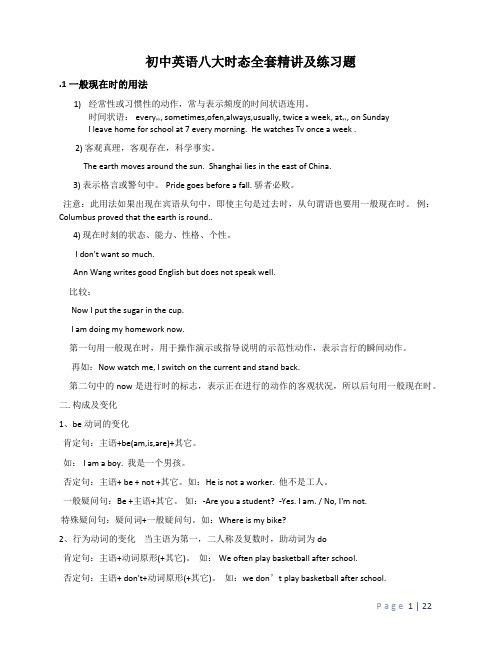
初中英语八大时态全套精讲及练习题.1 一般现在时的用法1)经常性或习惯性的动作,常与表示频度的时间状语连用。
时间状语: every…, sometimes,ofen,always,usually, twice a week, at…, on SundayI leave home for school at 7 every morning. He watches Tv once a week .2) 客观真理,客观存在,科学事实。
The earth moves around the sun. Shanghai lies in the east of China.3) 表示格言或警句中。
Pride goes before a fall. 骄者必败。
注意:此用法如果出现在宾语从句中,即使主句是过去时,从句谓语也要用一般现在时。
例:Columbus proved that the earth is round..4) 现在时刻的状态、能力、性格、个性。
I don't want so much.Ann Wang writes good English but does not speak well.比较:Now I put the sugar in the cup.I am doing my homework now.第一句用一般现在时,用于操作演示或指导说明的示范性动作,表示言行的瞬间动作。
再如:Now watch me, I switch on the current and stand back.第二句中的now是进行时的标志,表示正在进行的动作的客观状况,所以后句用一般现在时。
二. 构成及变化1、be动词的变化肯定句:主语+be(am,is,are)+其它。
如: I am a boy. 我是一个男孩。
否定句:主语+ be + not +其它。
如:He is not a worker. 他不是工人。
- 1、下载文档前请自行甄别文档内容的完整性,平台不提供额外的编辑、内容补充、找答案等附加服务。
- 2、"仅部分预览"的文档,不可在线预览部分如存在完整性等问题,可反馈申请退款(可完整预览的文档不适用该条件!)。
- 3、如文档侵犯您的权益,请联系客服反馈,我们会尽快为您处理(人工客服工作时间:9:00-18:30)。
1:一般现在时用法例句:American drinks a lot of coffee.Jack is very busy at the moment.The earth travels around the sun.As soon as I get to Beijing, I’ll ring you up.--When does the bus start?1.一般现在时的基本构成主语+动词原型主语为第三人称单数(he, she, it)时,动词用第三人称单数形式,其它人称主语动词用原形。
2. 一般现在时的用法1) 经常性的动作用于说明一个经常性、习惯性的动作。
这时句中常用often, usually, every day, sometimes等时间状语。
He goes to school at six every day.2)现在的状态和主语的特征We like surfing the Internet in our spare time.3. 一般现在时的特殊用法1) 事实和真理表示现在的状态、特征和按常理应该存在的情况,表示普遍真理或客观事实。
My parents live in a village near Shanghai.In autumn, leaves change from green to yellow.The sun rises in the east and goes down in the west.2) 代替将来时(1) 在时间状语从句和条件状语从句中,用一般现在时代替一般将来时:在由when, after, before, until, till, as soon as, the minute / second / moment, the next time 等引导的时间状语中由if, so / as long as, once, even if, although, whether…or…, in case, whatever, whenever, wherever 等引导的条件状语从句中If you come this afternoon, we’ll have a meeting.Aunt Lucy will tell us something about her trip to Australia when she comes back.(2) 用于时间表、日程表中,表示按计划要发生的动作,这时句中都带有时间状语,表示往返移动(come, go, arrive, leave, move, drive)或开始结束的动词(begin, end, open, close, start, stop),用一般式表将来。
The train leaves at nine in the morning. 火车上午九点出发。
--It starts in ten minutes. 再过10分钟。
4. 一般现在时常用的时间标志词:通常与表示频度的副词如often, sometimes, usually, always, occasionally 等和时间状语如in the evening, at night, twice a month, every day / week / month / year, on Sundays 等连用。
2:一般过去时例句:He saw Mr. Wang yesterday.I often went swimming last summer.My teacher didn’t tell me the fact.Did you attend the party yesterday?1.一般过去时的基础构成:主语+动词过去式2. 一般过去时的用法1) 表示过去某一时刻或某一段时间内所发生的动作或情况,,通常一般过去时带有表示动作时间状语的词,词组或从句,He lived in Paris until he was ten.2) 过去的习惯动作,常与时间状语every day, usually等连用。
I often went to see my aunt last year.3) 配合时态上的一致,用过去时。
He told me his mother was ill.3. 一般过去时常用的时间标志词yesterday, the day before last, last week,at that time, then, at that moment,yesterday morning (afternoon, evening…), last night (week, month, year…),一段时间+ ago(several days ago), two days ago, a week ago, three years ago, long long agoin 1990, just now, long before,.上下文清楚时可以不带时间状语。
3:一般将来时例句:I will go back to school tomorrow.Will you go to Paris with me?My brother is going to arrive here..1.一般将来时的基础构成1)由will/won’t加动词原形构成,可用于一切人称。
当主语I或we是时,也可用shall/shan’t 加动词原形。
2)be going to do sth.3) 例句:There is going to be a match this evening.There will be a wonderful concert this month.There be句型的将来时:(注意:其中的be不变)There will be…There is/are going to be…2. 一般将来时的用法1) will/won’t表示预测的将来,即认为某事肯定会发生;还可表示将来的意愿;将来的事实。
The weather will be good tomorrow.You look tired. I’ll cook dinner tonight.I’ll be thirteen years old next month.2) “be going to +动词原形”表示即将发生,或最近打算进行的。
It is going to rain.We are going to have a meeting today.注意:在时间状语从句或条件状语从句中,主句不能用be going to表示将来。
When he comes, I shall/will give him your message.3. 一般将来时常用的时间标志词this morning /afternoon /evening今天上/下午/晚上tomorrow明天,the day after tomorrow后天next week/month/year下个星期/下个月/明年in two days = in two days’ time两天后,in a week一星期后, soon例题例题1:(09年上海中考)When summer ________, some children will go to the seaside for fun.A)comes B)came C)will come D)would come解析:A时间条件状语从句中,不用将来时,用一般现在时态表示一般将来例题2:(11年上海中考)Now my father ________his bike to work everyday instead of drivingA) ride B) rode C) rides D) will ride解析:C now说明要用现在,everyday用一般时态例题3:(08年上海中考)Kevin ________ to work in his hometown after he graduated from university.A) goes B) went C) will go D) had gone解析:B after…graduated… 过去时之后发生用一般过去时比较:过去时之前用过去完成时相对于过去的某个时间点将要发生的事用过去将来时例题4:(10年上海中考)Tina and her parents ____________to England for sightseeing last summer.A) go B)went C) will go D)have gone解析:B after…graduated…过去时之后发生用一般过去时比较:过去时之前用过去完成时相对于过去的某个时间点将要发生的事用过去将来时例题5:(11年上海中考)We are glad to hear that the Greens ________to a new fiat next weekA) move B) moved C) will move D) have moved解析:C next week用一般将来时,主句are glad to现在时不影响从句时态4:现在进行时用法例句:We are living a happy life.Is Jack making his model plane?We are leaving here tomorrow.It is still raining outside.1.现在进行时的基础构成:主语+be动词(am, is, are)+现在分词构成2. 现在进行时的用法1) 动作正在进行:表示说话者说话时正在发生的动作或者目前一段时间内正在进行的动作或某些体感动词的持续状态。
They are playing tennis,My foot is hurting.现在进行时的时间状语为now ,at the moment,但很多题目在考察进行时态时没有明确的时间状语*.某人现在不能做某事,因为他正在做…*.用look!…listen!…等开头,强调某人正在做某事*.现在..点了/很晚了,但是(but)某人仍然(still)正在做某事2) 代替最近的将来表示最近的将来,常伴有时间状语。
这类词有:come, go, leave, arrive, start, stop, fly等。
They are getting married next month.5:过去进行时用法例句:I was sleeping at 3:00 last Sunday.Were you working all the time yesterday?What were you doing yesterday morning?1.过去进行时的基础构成主语+was/ were + 现在分词2. 过去进行时的用法1)表示过去某一时间或某一段时间内正在进行的动作。
